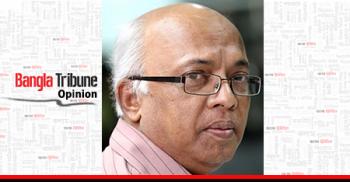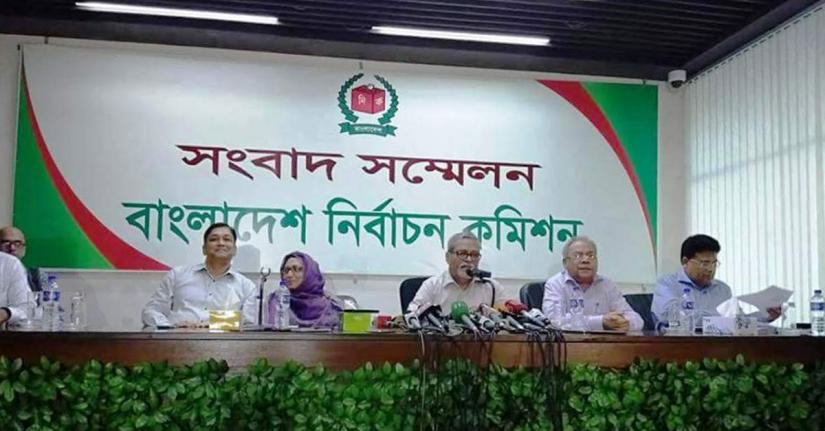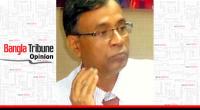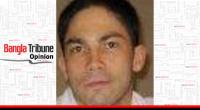 Chief Election Commissioner KM Nurul Huda has informed the country that it is not the responsibility of the Election Commission to bring voters to the polling stations.
Chief Election Commissioner KM Nurul Huda has informed the country that it is not the responsibility of the Election Commission to bring voters to the polling stations.
He is quite right, for it is the supreme task of the Election Commission, more than anything else, to organize elections.
The CEC has also let it be known that it is for the political parties to educate citizens on their duty to cast their votes at elections.
He is right on this score too, for democracies are essentially what political leaders and their parties conceive it to be.
Such truths notwithstanding, there are the very serious responsibilities which the Election Commission is constitutionally ordained to carry out in the larger national interest. In our times, we have had the experience, here in Bangladesh, of observing with satisfaction the methods through which the Election Commission can assert its presence in the centre of things and in the public imagination.
Back in 1991, the Election Commission accomplished a tough job of organizing parliamentary elections in the aftermath of the fall of a military dictatorship.
In June 1996, the Election Commission made sure that the sentiments of citizens were properly and adequately reflected through their exercise of the vote.
In 2008, it was once more an Election Commission which gave the country the opportunity to bring to office a government in tune with the demands and desires of citizens.
Go somewhat further back in time, when in the Pakistan era, the Election Commission organized a general election in 1970 where citizens, especially Bengalis, were able to vote for a leadership they were convinced would lead them to their cherished goals.
Given the instances above, it is critical to bear in mind that an Election Commission must operate on the foundations of integrity, on the bedrock of an unassailable dedication to the principles of democracy. An Election Commission must not be seen to be pusillanimous or kowtowing before any authority outside or beyond itself. It is the pivot around which the aspirations of citizens find expression, for citizens discern in the Election Commission the perfect vehicle to re-energise them in their perfectly well-reasoned belief that they are the power which sustains the State and are the engine which keeps it going.
And that is the reason why an Election Commission is in constant requirement of the life force that will drive it forward. It needs to be a well-oiled machine people can repose their trust in through convincing themselves that their votes will be safe, will be counted, that indeed the polling stations where they are expected to cast their ballots will be territory where they will feel secure, where citizens of divergent political persuasions will express their opinion through their votes and go home to wait for the results of the exercise. For an Election Commission, therefore, there is something more than putting up the argument that it is not its responsibility to bring voters to the polling stations. A cavernous polling station populated by election officials waiting for citizens to turn up to vote is an embarrassment for an Election Commission. It is a sign that the Election Commission is not doing its job well, that public confidence in its ability to preside over good elections is being eroded. It is not enough to say that fifty per cent of voters have made their preferences known at the ballot box. The argument is unacceptable that people were not able to vote because of inclement weather. Platitudes will not change public perceptions of an Election Commission on whose watch public interest in voting is in steep decline.
For an Election Commission, therefore, there is something more than putting up the argument that it is not its responsibility to bring voters to the polling stations. A cavernous polling station populated by election officials waiting for citizens to turn up to vote is an embarrassment for an Election Commission. It is a sign that the Election Commission is not doing its job well, that public confidence in its ability to preside over good elections is being eroded. It is not enough to say that fifty per cent of voters have made their preferences known at the ballot box. The argument is unacceptable that people were not able to vote because of inclement weather. Platitudes will not change public perceptions of an Election Commission on whose watch public interest in voting is in steep decline.
Bangladesh’s Election Commission, being a constitutional body empowered to plan, organize and hold elections, cannot and should not take refuge behind statements that leave people upset or angry or amused. It becomes the particular task of an Election Commission in any democratic dispensation to guarantee candidates for office opportunities for equal space in terms of electioneering. Every candidate has the right to conduct his or her campaign without intimidation; every candidate for elective office must be on his or her toes for fear that any transgression will bring down on him or her the heavy, sharp sword of lawful retribution wielded by the Election Commission.
An Election Commission will not go from door to door asking citizens to take a walk to their voting centres. An Election Commission will not decree a ban on vehicular movements on the streets on voting day, but must ensure that as many vehicles as are available to citizens and parties and candidates must be out on the streets. An Election Commission must inspire people in reinforcing their belief in their power to remain masters of their destiny. It must convince them that their votes have meaning, that their votes are safe, that any doubts or questions or suspicions threatening to cloud their thoughts will be put at rest by election officials across the country. Those who administer an Election Commission are expected to be men and women whose sense of independence must assert and reassert itself without pause.
Empty voting centres and drowsy polling officers and indifferent voters are conditions that an Election Commission has a bounden duty to reverse. For that to be done, an Election Commission must transform itself into a force for public good through impressing on citizens the idea that it means business.
No, an Election Commission will not bring voters to the polling stations. But an Election Commission must shape the happy landscape that will have citizens, of their own volition and in the spontaneity of their enthusiasm, trek in droves to the polling centres in their neighbourhood.
Syed Badrul Ahsan is the editor in charge at the Asian Age.
 Opinion
Opinion
30736 hour(s) 16 minute(s) ago ;
Morning 11:10 ; Friday ; Apr 19, 2024
The meaning of an Election Commission
Send
Syed Badrul Ahsan
Published : 16:44, Mar 03, 2019 | Updated : 16:56, Mar 03, 2019
Published : 16:44, Mar 03, 2019 | Updated : 16:56, Mar 03, 2019
0 ...0 ...
/hb/
Topics: Syed Badrul Ahsan
***The opinions, beliefs and viewpoints expressed in this article are those of the author and do not reflect the opinions and views of Bangla Tribune.
- KOICA donates medical supplies to BSMMU
- 5 more flights to take back British nationals to London
- Covid19: Rajarbagh, Mohammadpur worst affected
- Momen joins UN solidarity song over COVID-19 combat
- Covid-19: OIC to hold special meeting
- WFP begins food distribution in Cox’s Bazar
- WFP begins food distribution in Cox’s Bazar
- 290 return home to Australia
- Third charter flight for US citizens to return home
- Dhaka proposes to postpone D8 Summit
Unauthorized use of news, image, information, etc published by Bangla Tribune is punishable by copyright law. Appropriate legal steps will be taken by the management against any person or body that infringes those laws.
Bangla Tribune is one of the most revered online newspapers in Bangladesh, due to its reputation of neutral coverage and incisive analysis.
F R Tower, 8/C Panthapath, Shukrabad, Dhaka-1207 | Phone: 58151324; 58151326, Fax: 58151329 | Mob: 01730794527, 01730794528


